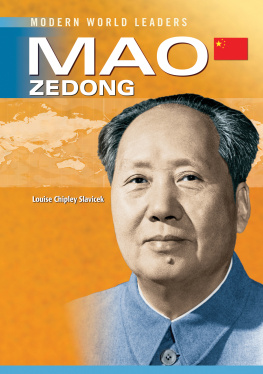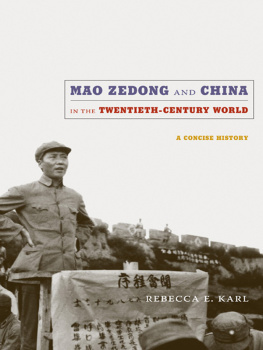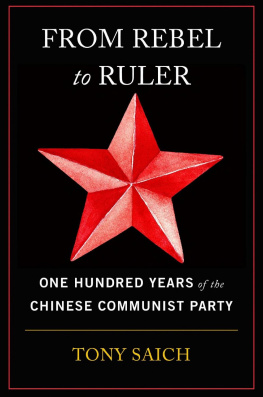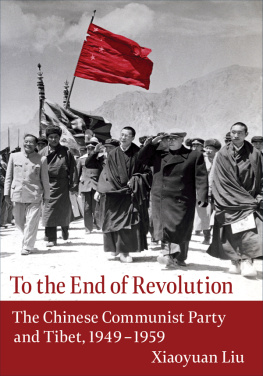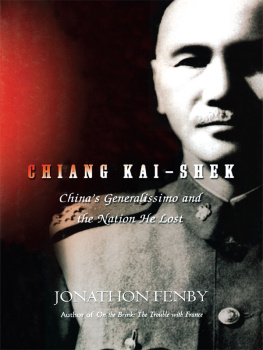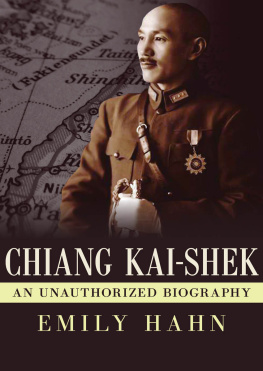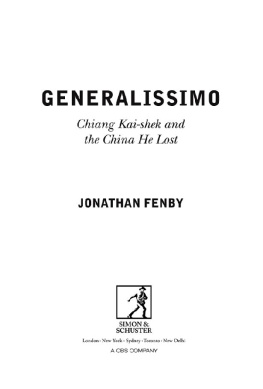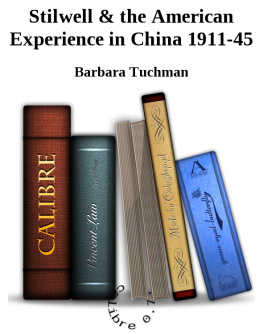Louise Chipley Slavicek - Mao Zedong
Here you can read online Louise Chipley Slavicek - Mao Zedong full text of the book (entire story) in english for free. Download pdf and epub, get meaning, cover and reviews about this ebook. year: 2013, publisher: Infobase Publishing, genre: Non-fiction. Description of the work, (preface) as well as reviews are available. Best literature library LitArk.com created for fans of good reading and offers a wide selection of genres:
Romance novel
Science fiction
Adventure
Detective
Science
History
Home and family
Prose
Art
Politics
Computer
Non-fiction
Religion
Business
Children
Humor
Choose a favorite category and find really read worthwhile books. Enjoy immersion in the world of imagination, feel the emotions of the characters or learn something new for yourself, make an fascinating discovery.
- Book:Mao Zedong
- Author:
- Publisher:Infobase Publishing
- Genre:
- Year:2013
- Rating:3 / 5
- Favourites:Add to favourites
- Your mark:
- 60
- 1
- 2
- 3
- 4
- 5
Mao Zedong: summary, description and annotation
We offer to read an annotation, description, summary or preface (depends on what the author of the book "Mao Zedong" wrote himself). If you haven't found the necessary information about the book — write in the comments, we will try to find it.
Mao supported the 1911 Revolution and became one of the founders of the Chinese Communist Party in 1921. During the mid-1930s Chiang Kai-shek carried out a series of militar
Mao Zedong — read online for free the complete book (whole text) full work
Below is the text of the book, divided by pages. System saving the place of the last page read, allows you to conveniently read the book "Mao Zedong" online for free, without having to search again every time where you left off. Put a bookmark, and you can go to the page where you finished reading at any time.
Font size:
Interval:
Bookmark:
Copyright 2013 by Infobase Learning
All rights reserved. No part of this publication may be reproduced or utilized in any form or by any means, electronic or mechanical, including photocopying, recording, or by any information storage or retrieval systems, without permission in writing from the publisher. For more information, contact:
Chelsea House
An imprint of Infobase Learning
132 West 31st Street
New York NY 10001
ISBN 978-1-4381-4888-5
You can find Chelsea House on the World Wide Web
at http://www.infobaselearning.com
On October 1, 1949, an excited throng gathered before the Gate of Heavenly Peace (Tiananmen) in Beijing, China, to witness the birth of a new epoch in their homeland's long history. The crowd let out a great cheer as Mao Zedong, chairman of the Communist Party of China and the new leader of the Chinese state, stepped out onto a balcony high on the towering gate.
Clearing his throat, Mao began to speak. He reminded his listeners of how their ancient homeland had been exploited and bullied by foreign powers for more than a century and was only now emerging from three devastating years of fullscale civil war between his Communist forces and the Nationalist armies of Chiang Kaishek. Thanking all those Chinese who had "laid down their lives in the many struggles against domestic and foreign enemies" during the course of the past tumultuous century, Mao assured his audience that the humiliation, disunity, and violence that had plagued China for so long were over at last.1
"We, the 475 million Chinese people, have stood up," he proclaimed, "and our future is infinitely bright."2
When Mao announced the establishment of the People's Republic of China (the new state that would lead the Chinese people into their "infinitely bright" future) there was an eruption of clapping, shouting, and jubilation from the square below. Over and over again, the crowd yelled, "Long live the People's Republic!" "Long live the Communist Party!" and loudest and of all, "Long live Chairman Mao! A long, long, life to Chairman Mao!"
Indeed, it probably would have been impossible for anyone in Tiananmen Square that autumn day to conceive of this hopeful new era in Chinese history without Chairman Mao. For more than two decades, Mao had led the communists in their fight against their chief internal foeChiang Kaishek and his nationalistspausing from the bitter struggle with Chiang only to help drive the Japanese army from China during the Sino-Japanese War (19371945).
Political power, Mao bluntly declared early in his long struggle for control of China, flows "from the barrel of the gun."3 On October 1, 1949, as Mao announced the founding of the People's Republic after more than two decades of armed conflict with domestic and foreign foes, it seemed that his dictum regarding the inextricable bond between political and military might was being proved true. Mao's successful campaign to attain supreme political power in China for himself and the Communist Party he dominated, most scholars concur, owed a great deal to his remarkable skill and tenacity as a military leader. With virtually no help from outside allies and little formal military training, Mao managed to transform a ragtag peasant band into a well-disciplined and motivated army of millions, as well as devise an effective guerrilla-warfare strategy for it to resist larger, better-equipped adversaries.
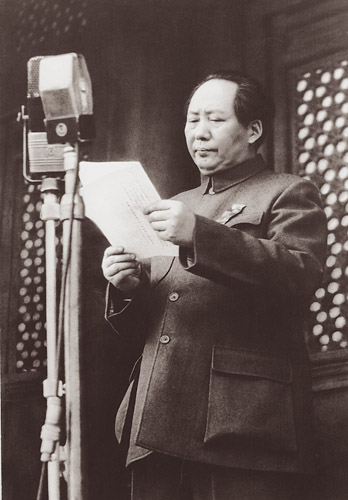
October 1, 1949, marked a pivotal point in China's history. With Beijing's Tiananmen Square filled with excited onlookers, Communist Party Chairman Mao Zedong proclaimed the founding of the Peoples' Republic of China. Mao's resourcefulness in reaching that goal proved him to be one of the century's most important military leaders.
Source: Associated Press.
From 1949 until his death in 1976 at the age of 82, Mao Zedong would dominate the new communist state that his adept military leadership had helped to create. Chairman Mao was the key figure behind every important military and political path that the People's Republic followed during those three decades: its early alliance with the Soviet Union and the eventual collapse of that coalition; its deep involvement in the Korean War and more limited role in the Vietnamese conflict; its reliance on the national army to promote and then to rein in the terror of the notorious Cultural Revolution; and finally, its startling rapprochement with a long-standing and powerful enemy, the United States.
Mao Zedong will long be remembered as one of the twentieth century's most resourceful military and political leaders. Unquestionably, he was also one of its most influential. For as Mao was building and maintaining his considerable personal power within China, he was also making his once weak and divided homeland into a major global power and transforming forever the lives of billions of his compatriots.
- 1. Quoted in Ross Terrill, Mao Zedong: A Biography. Rev. ed. Stanford: Stanford University Press, 1999, p. 198.
- 2. Quoted in Philip Short, Mao: A Life. New York: Henry Holt, 2000, p. 419.
- 3. Quoted in Jonathan Spence, Mao Zedong. New York: Penguin, 1999, p. 75.
Mao Zedong was born in the tiny village of Shaoshan in south-central China on December 26, 1893. Mao made his appearance in the world at a painful time in his homeland's long history, as China confronted grave threats to its economic and political independence from abroad and weak leadership at home. Traditionally, the Chinese had viewed their vast country as the "Middle Kingdom," the very heart of the civilized world. By the late 1800s, however, faced with the modernized armies and technological expertise of the imperialist West, the once proud Middle Kingdom had been humiliated and demoralized.
After years of self-imposed isolation from the outside world, during the half-century preceding Mao Zedong's birth China found itself besieged by western merchants and governments determined to carve out "spheres of influence" for themselves in Asia's largest and most populous country. As the nineteenth century progressed, the ineffectual emperors of China's ruling family, the Qing Dynasty, made only feeble efforts to halt the growing exploitation of their country's economy and natural resources by England, Russia, and other foreign powers. Intimidated by their modernized armies, China's leaders allowed the intruders to set up their own courts of law within the empire and evade Chinese justice; control naval stations, railroad, and mining rights in a number of vital areas; and exact sweeping trade privileges.
When Mao was still an infant, China's chief Asian rivalJapantook advantage of its neighbor's weakness by invading Korea, a longtime Chinese tributary. By 1895, Japan's modernized army had managed to conquer not only Korea but also Taiwan, which China had governed for centuries. Five years later, the Middle Kingdom's national pride received another blow when the Boxer Rebellion, a violent crusade to expel all foreigners from China, was crushed with brutal efficiency by an international army including Japanese, American, and European troops.
The poverty and backwardness of China's predominantly rural populace added greatly to the country's weakness in the face of its foreign rivals. At the turn of the twentieth century, China was far less industrialized or urbanized than Japan or any of its western rivals. As had been the case for countless centuries, the vast majority of Chinese were illiterate peasants who barely managed to eke a living out of the land. Compelled to rent their fields at prohibitive rates from a small group of wealthy landlords, they were perpetually in debt, with scant hope of ever improving their economic situation. Consequently, social unrest was rampant among the Chinese peasantry, especially in Mao's home province of Hunan, where land rents were notoriously high. During Mao's childhood, thousands of angry peasants descended on the provincial capital of Changsha, demanding food after drought and famine struck Hunan. Their protest, however, ended quickly when government forces opened fire on the marchers.
Font size:
Interval:
Bookmark:
Similar books «Mao Zedong»
Look at similar books to Mao Zedong. We have selected literature similar in name and meaning in the hope of providing readers with more options to find new, interesting, not yet read works.
Discussion, reviews of the book Mao Zedong and just readers' own opinions. Leave your comments, write what you think about the work, its meaning or the main characters. Specify what exactly you liked and what you didn't like, and why you think so.

